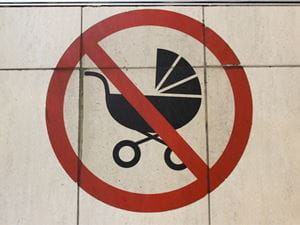
Much to her horror, something seems to happen to a woman once she reaches a certain point in her life. The whispering begins. Friends start giving her “the look.” And then, finally, mom walks into the room and drops the bomb.
“So, when are you going to have a baby?”
But it doesn’t end with dear old mom. Society, too, asks this same question of nearly every woman, but there’s a catch—it expects them to enthusiastically say “yes.”
Articles like this one from The Atlantic might seem to simply show facts and figures, but the piece is steeped in language that paints purposefully childless women as narcissistic, careless, and most of all, selfish. And worst of all, this language seems unintentional—a byproduct of the culture in which the writer is immersed. This is indicative of a larger attitude toward childless women.
Where society tends to measure men by their earnings, belongings, and other tangible signals of success, it often measures women by their ability to raise children. And taking a look at the above article, the newest generation of women is having fewer children than ever.
There has been backlash against these women. A study published in Sex Roles: A Journal of Research shows that most people still view parenthood as a moral imperative. Rather than childbirth being seen as a matter of choice, it is seen as a matter of right and wrong. It is a moral failing, and participants in the study indicated that they felt moral outrage, anger, disgust, and disapproval toward voluntarily childless individuals.
But what society deems to be true isn’t always what actually is true. Let’s examine the question of whether it is truly selfish to choose a child-free life a little more deeply, beginning with why so many feel that childrearing is a moral imperative.
Enforced Societal Norms
The above study shows just how strongly people feel that childbirth is the morally correct choice. But in our increasingly diverse, choice-loving, and empathetic society, why are women constantly forced to justify their decision to forego children?
This attitude, for the most part, has simply been passed down through the generations. In the distant past, a woman’s failure to produce a male heir was grounds for divorce. For much of our human history, women were seen as the purveyors of legacy—they were expected to pass on the bloodline. And before legacy, childbirth simply ensured the survival of a group or tribe.
Today, we’ve left these concerns behind, but for many, the attitude remains: the purpose of life, it seems, is to create more life. And if you’re not pursuing the purpose of life, what good are you?
Although the way forward will surely create a very different view, right now, childless women are too-often seen as defective or selfish because of societal norms that continue to be passed down. But as we’re about to see, childlessness is quickly becoming much more common—and the reasons for this are far from selfish.
The Problem of Purpose
The newest generations have a different view of the world than any previous. From their perch atop the social media and internet skill tree, they’re constantly kept abreast of what’s happening all around the world. Where once, news was fairly local, now it is a constant barrage of global atrocity that cannot be ignored.
This has affected them. Because they see the effects of overpopulation, environmental destruction, poor governance, and economic disaster, their view of the world has changed. It’s a fearful place. It’s a place where one cannot feel secure.
For many, this is no place to have a child—there simply is no choice.
But apart from the fear, there is a huge push from younger generations to not just sit at home, but to get out and improve the world. They have the unprecedented ability to see problems, but also the unprecedented to see solutions. And so rather than bring another human being into a diseased world, they want to fix things.
Is a life spent in pursuit of bettering the world for future generations somehow lesser than a life spent raising a child in the current one? Is one purpose better than the other?
While you ponder that, let’s examine childlessness of a more voluntary sort.
The Love of the Self
The love of the self is a funny thing. American culture places confidence on a pedestal—on the altar of worship, to be more accurate. We voraciously consume self-help books meant to aid in our quest to love ourselves, and we listen to TED talks that tell us how valuable we are.
Yet some kinds of self-love are taboo—namely, the choice to pursue a life defined by personal pleasure rather than the life of child-rearing which society deems more responsible.
But, again, consider what really makes one choice better than the other. In the absence of the need to re-populate the Earth after some disaster, there is no urgent reason to have children, and so we are left with only one answer—tradition.
And so the question is no longer “Are children more important than happiness?” It is “Is tradition more important than happiness?”
The answer to that should be obvious.
Conclusions
"So when are you going to have that baby?” your mother asks, for the second time. After a moment’s hesitation, you answer.
“I’m not. Because I don’t want children.”
That’s okay. And it’s also selfish.
Which is, by the way, also okay.
There is nothing wrong with seeking the best life for yourself, with being selfish in a way that hurts no one. After all, isn’t that just what people do when they decide to have a child—choosing the life that is best for them?
The societal pressure to have a child is based on tradition, and that tradition is based on a necessity we simply no longer have. There will always be enough people in the world who wish to start a family—that’s wonderful for them. But there’s no need to feel pressured to join them, or to pressure others to do so.
So, yes. It is selfish to go childless. Gloriously, wonderfully selfish. Make the choice that is best for you, your life, and your partner rather the choice that society tells you to make. This is how you live a truly fulfilling life.

